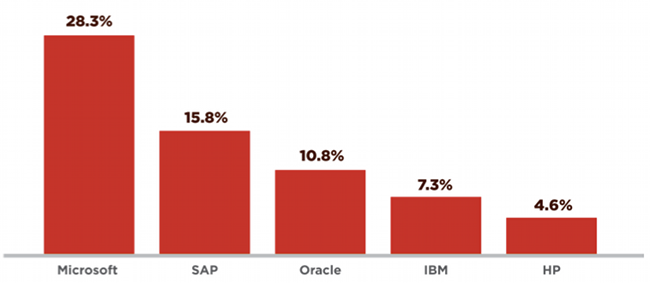Original URL: https://www.theregister.com/2013/01/28/open_and_shut/
My top tip for Microsoft: Stop charging for Windows Phone 8
Really guys, you're trying to SELL a mobile OS? C'mon
Posted in On-Prem, 28th January 2013 13:01 GMT
Open ... and Shut While Microsoft posted solid numbers for Windows 8, anyone paying attention to Intel's quarterly report can see that the writing is on the wall for desktop computing. Perhaps surprisingly, this is also true of the enterprise, generally not an early mover on technology trends. According to a new Appcelerator survey of enterprise IT executives, 2013 marks the first year that enterprises will build more mobile applications than desktop applications.
More surprisingly still, Microsoft appears to be the go-to mobile vendor for the enterprise.
A full 87 per cent of those surveyed indicate that more mobile apps than desktop apps will be built within the enterprise in 2013. Microsoft, the company (and not just Windows), is viewed by 28.3 per cent to be showing mobile leadership, with each of the other big enterprise vendors trailing in its wake:

No, these vendors aren't normally considered mobile's go-to vendors, but for the enterprise they definitely are.
All of which indicates Microsoft might have a chance.
After all, sales of Windows smartphones are up 400 per cent over last year, as The Register reports, but that's on a minuscule base. While Microsoft's strategy of badgering its desktop OEM partners to ship Windows 8 hasn't worked, a more plaintive tone just might. Samsung and Apple lead the pack in smartphone shipments, with roughly half the market between them, according to IDC's Worldwide Quarterly Mobile Phone Tracker, and neither has any incentive to embrace Windows.
But this still leaves half the market that desperately needs an answer to these two mobile juggernauts:

Source: IDC Worldwide Mobile Phone Tracker, 24 Jan, 2013
Windows can be that answer, particularly within the enterprise, which has yet to definitively settle on a particular platform, despite early BYOD (bring your own device) adoption of Apple gear and more recent momentum for Samsung's Android phones. Microsoft already has Nokia's support, which shows up in the "Others" category with 4.4 million shipments of its Lumia smartphones in the fourth quarter, but it needs more.
After all, despite Appcelerator's survey indicating a clear preference for Microsoft among the mega-vendors, it also demonstrates continued affinity for iOS (80 per cent of enterprises "very interested" in developing for the iPhone and 79 per cent for the iPad) and Android (64 per cent for Android phones, 52 per cent for Android tablets), with a mere 29 per cent very interested in developing for Windows phones and 30 per cent for Windows tablets.
I've argued that Microsoft should consider Firefox OS as an option (56 per cent of enterprises "very interested" in developing for HTML5), but there's an even easier alternative to try out: subsidized Windows Phone 8.
Android didn't initially make headway against Apple because it was better. It wasn't. Far from it. No, Android won over the handset vendors and other partners because it was cheap. Cheaper than free.
For years Google has subsidized Android adoption, paying handset vendors and others to deploy the OS. Microsoft, with billions upon billions in the bank and everything to lose if it doesn't win in mobile, can afford to do the same. And then some.
Microsoft, however, has been doing the opposite.
Last year, Microsoft was reported to be licensing Windows Phone 8 to ZTE for $23 to $30 per device. For tablets it's worse: $85 per device.
It's cute and quaint that Microsoft is still trying to sell a mobile OS in a market where no one pays for a mobile OS. It's also stupid.
Despite Microsoft's understandable love affair with its old per-device licensing model, if it wants to win in mobile, it needs to take its toehold in the enterprise and subsidize its way to more mobile market share. This isn't a market where superior technology necessarily wins. Not at first, anyway. Money talks, as Android showed, and Microsoft has lots of that. It's time to put it to use. ®
Matt Asay is vice president of corporate strategy at 10gen, the MongoDB company. Previously he was SVP of business development at Nodeable, which was acquired in October 2012. He was formerly SVP of biz dev at HTML5 start-up Strobe (now part of Facebook) and chief operating officer of Ubuntu commercial operation Canonical. With more than a decade spent in open source, Asay served as Alfresco's general manager for the Americas and vice president of business development, and he helped put Novell on its open source track. Asay is an emeritus board member of the Open Source Initiative (OSI). His column, Open...and Shut, appears three times a week on The Register. You can follow him on Twitter @mjasay.